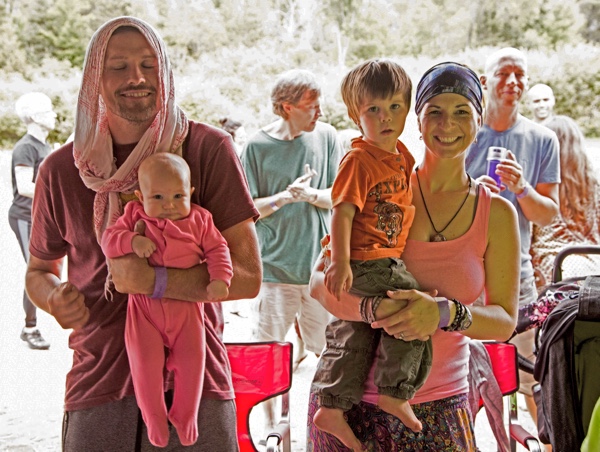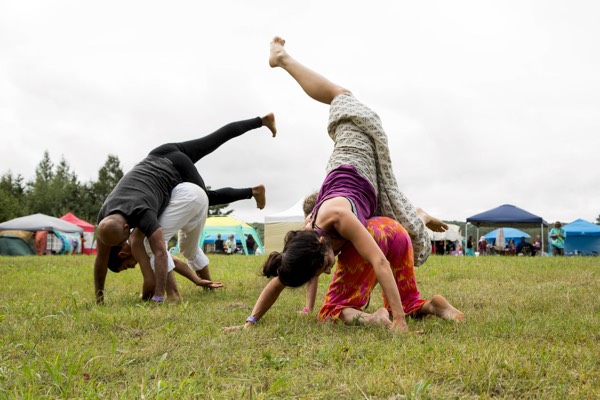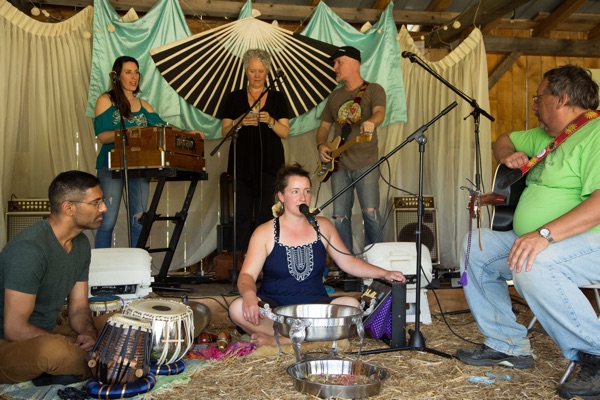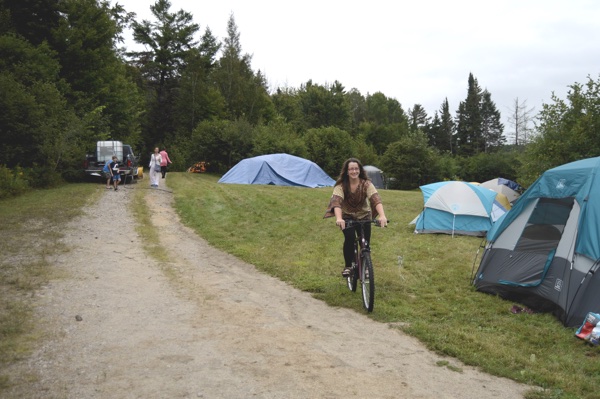“Om. Shanti.” The traditional call to mindfulness and peace will echo through a woodland oasis near Ladysmith—north of Shawville, in the Pontiac region of the Outaouais—next weekend during Bhakti in the Woods.
Bermalva Porter is the visionary and shaman behind Bhakti in the Woods. During this three-day festival (August 17 to 19), now celebrating its sixth year, she welcomes visitors to experience chanting, yoga, music, dance, meditation and delicious organic food.
What does Bhakti mean?
Bhakti (pronounced “back-tea”) is a Sanskrit word meaning devotion, usually to the Divine.
Bermalva explains, “It’s a certain way of practising yoga, the universal spiritual practice. Bhakti requires the belief that all Creation is divine and, thus, can be used towards one’s devotion to family, music, spiritual path, profession, garden, pets and so on.”
I asked her what she feels visitors most benefit from. Bermalva replied, “Definitely from cultivating belonging and reverence for all things sacred. Belonging. Today, many people feel removed from community: They don’t feel they belong on Earth.

“So, during our festival, the simple act of being together has its own effect, coupled with the concerts, workshops and events, which naturally bring renewed faith in life and union in community. Reverence or acknowledgement of life as being sacred is something that can be expressed and experienced through ceremony, song, dance or simply walking through the forest.”
Sustainability in the Outaouais
Many of us find serenity—including a sense of personal restoration—when we “forest bathe” or immerse ourselves in forested natural settings. The Japanese call this phenomenon “Shinrin-yoku,” which means “taking in the forest atmosphere.” It’s a meditation practice that started in Japan in the 1980s, then spread to South Korea. Now it’s an internationally popular approach to good health.
At Bhakti, participants discover similar respect for Nature and its healing properties. That is what Bermalva means when she speaks of sustainability at Bhakti.

She explains, “Our sustainability platform for this year’s theme comes to encompass a larger meaning of the word sustainability, including spiritual sustainability—or the ability to sustain and maintain practices and meaningful life that enhances the human being from within, as well as the environmental and external world. Here at the festival, we also feature eco-technologies and vendors, as well as ‘inner eco’ technologies in our classes and workshops.”
Educating toward a New Earth
Beyond sustainability, Bermalva speaks to another significant movement today: the concept of the New Earth. What does that mean?
“The New Earth is what I, and many others on the spiritual path, think of as a conscious evolution of current dwelling on the Earth. For example, there are many companies and people who act from the need to gain monetary wealth, without exhibiting any connection to the greater picture, and not realizing their link to it all.

“So the New Earth is a certain perspective of planetary evolution, one … which we are either currently aware of, working to enhance, or simply oblivious to. It’s more of a perspective and realization state of mind, which, in turn, creates our reality and the world in which we live.”
Therefore, Bhakti offers more than the simple pleasure of listening to beautiful music, and participating in dance, kirtan (chanting) and yoga workshops. As well, visitors can learn about the New Earth movement and sustainable spiritual engagement with the natural world, all while meeting like-minded people.
A typical day at Bhakti
“A typical festival day starts with yoga and workshop classes around 7:30am, and from then on, every hour has something new and exciting to discover,” Bermalva says. “A yoga class and a workshop take place simultaneously, so everyone can select activities from our online schedule.”
Between the classes and workshops, musicians from around the world offer yoga music and kirtan (chanting) concerts. The programming ends at sundown, with a bonfire surrounded by musicians who will perform late into the night.
One aspect of this festival that appeals to me is the community-generated workshops. As Bermalva explains, “This is how the festival generates itself. They are spontaneous workshops that just happen anytime, in a localized space that is separate from the other workshop tents.”
Talk about an accessible, open festival!
Admission, accommodations and more
The website gives information on day passes, weekend passes and special family passes, all of which include parking. Advance registration is advised, as the property can only hold 300 people. “Our ticket sales truly are capped at the 300 mark to maintain sustainability on the land during the event,” Bermalva explains.

Photo by Joana Filguieras.
Onsite camping is available (bring your own tent or RV), and you can buy vegetarian meals or bring your own food. Composting toilets, outside showers and sinks, and food composting and recycling facilities will be provided. The festival website also includes links to local hotels and accommodation rentals.
Vendors galore will be selling clothing, herbs, gemstones, massage therapy, art and local products.
Incidentally, if this hot and humid weather persists, you’ll be glad to know there are nearby swimming holes.
If you go
For more details or to register, see the Bhakti in the Woods website.
There’s also an event Facebook page, as well as an event Facebook page for ride shares.
Katharine Fletcher is a freelance writer, author and visual artist. See her website for information on her local guidebooks. She also invites you to like her Facebook artist page.
Want more tips on road trips from Ottawa—including info on hotel discounts, contests, festivals and other cool news? Subscribe to the free weekly Ottawa Road Trips e-newsletter! We will never spam you—promise.

1 comment
[…] workshops, devotional chanting, world music, craft and food vendors, and more. (Here’s a post about last year’s Bhakti in the Woods by guest author Katharine Fletcher, to give you a taste of what to […]